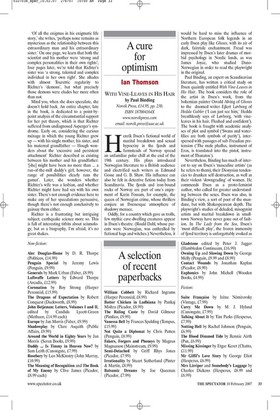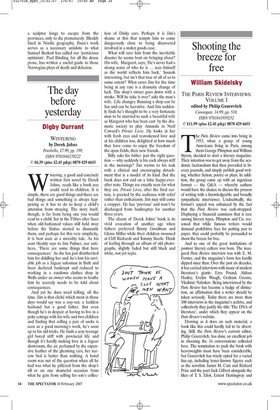A cure for optimism
Ian Thomson WITH VINE-LEAVES IN HIS HAIR by Paul Binding Norvik Press, £14.95, pp. 230, ISBN 187004164X www.norvikpress.corn email: norvik.press@uae.ac.uk Henrik Ibsen's fictional world of marital breakdown and sexual hypocrisy in the fjords and farmsteads of Norway spread an unfamiliar polar chill at the end of the 19th century. His plays introduced Norwegian literature to a British audience and electrified such writers as Edmund Gosse and G. B. Shaw. His influence can also be felt in detective fiction today from Scandinavia. The fjords and iron-bound rocks of Norway are part of one's enjoyment of Karin Fossum, for example, the queen of Norwegian crime, whose thrillers conjure an Ibsenesque atmosphere of shadowy menace.
Oddly, for a country which gave us trolls, few mythic cave-dwelling creatures appear in Ibsen's theatre. (Roald Dahl, whose parents were Norwegian, was enthralled by fictional hags and witches.) Nevertheless, it would be hard to miss the influence of Northern European folk legends in an early Ibsen play like Ghosts, with its air of dark, fairytale enchantment. Freud was impressed by Ibsen's later dramas of morbid psychology in Nordic lands, as was James Joyce, who studied DanoNorwegian in order to read the playwright in the original.
Paul Binding, an expert on Scandinavian literature, has written a critical study on Ibsen quaintly entitled With Vine-Leaves in His Hair. The book considers the role of the artist in Ibsen's work, from the bohemian painter Osvald Alving of Ghosts to the doomed writer Ejlert Lovborg of Hedda Gabler (I can just see him,' Hedda breathlessly says of Loborg, 'with vineleaves in his hair. Flushed and confident'). The book is fraught with academic analyses of plot and symbol (Swans and waterlilies are both symbols of purity'), interspersed with passages of sub-Freudian pretension (The male phallus, instrument of Eros, is translated into the pistol, instrument of Thanatos').
Nevertheless, Binding has much of interest to say on Ibsen's 'masculine artists' (as he refers to them), their Dionysian tendencies to drunken self-destruction, as well as their violent 'downgrading' of women. He commends Ibsen as a proto-feminist author, who called for greater understanding between the sexes. Ibsen was also, in Binding's view, a sort of poet of the mundane, but with Shakespearean depth. The playwright's studies of deluded, misogynist artists and marital breakdown in smalltown Norway have never gone out of fashion. In The Lady from the Sea, Ibsen's 'most difficult play', the frozen immensity of fjord territory is unforgettably evoked as a sculptor longs to escape from the provinces, only to die prematurely. Bleakly fixed in Nordic geography, Ibsen's work serves as a necessary antidote to what Samuel Beckett has called our 'pernicious optimism'. Paul Binding, for all the dense prose, has written a useful guide to those Norwegian plays of death and delusion.














































 Previous page
Previous page